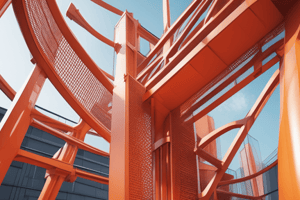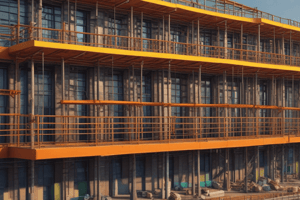Podcast
Questions and Answers
What structural element is considered the most important in buildings?
What structural element is considered the most important in buildings?
- Slabs
- Foundations
- Beams
- Columns (correct)
How do vertical bars enhance the ultimate capacity of a plain concrete column?
How do vertical bars enhance the ultimate capacity of a plain concrete column?
- By increasing lateral support
- By reducing the axial load
- By decreasing the tendency to buckle out (correct)
- By decreasing longitudinal support
What is the purpose of lateral reinforcement or ties in reinforced concrete columns?
What is the purpose of lateral reinforcement or ties in reinforced concrete columns?
- To enhance the axial load-carrying capacity
- To increase longitudinal support
- To reduce the size of the column
- To prevent concrete expansion due to Poisson's effect (correct)
Why are reinforced concrete columns classified as tied or spiral?
Why are reinforced concrete columns classified as tied or spiral?
Why is a minimum longitudinal reinforcement ratio provided in reinforced concrete columns?
Why is a minimum longitudinal reinforcement ratio provided in reinforced concrete columns?
How are reinforced concrete columns classified based on length and end restraint?
How are reinforced concrete columns classified based on length and end restraint?
Study Notes
Importance of Columns
- Columns are the most critical structural element in buildings.
- A significant number of structural failures are attributed to column failure.
Functionality of Columns
- Plain concrete columns can carry compression forces.
- Adding vertical bars to plain concrete columns greatly enhances their ultimate capacity.
Role of Lateral Reinforcement
- Lateral reinforcement or ties provide support to longitudinal bars, decreasing their tendency to buckle out.
- They prevent concrete from expanding laterally due to Poisson's effect, increasing the concrete's ultimate strain.
Classification of Reinforced Concrete Columns
- Reinforced concrete columns are classified into two types: tied or spiral, based on the lateral confinement type.
Eccentricity in Columns
- In actual practice, axially loaded columns do not exist, and some percentage of eccentricity always occurs.
- Eccentricity can be caused by the reduction of column size from one floor to another or the misalignment of the column.
- A minimum longitudinal reinforcement ratio is required to account for stresses resulting from eccentricity.
Classification of Columns based on Length and Restraint
- Reinforced concrete columns are classified as short or long, depending on the length to width ratio and end restraint conditions.
Studying That Suits You
Use AI to generate personalized quizzes and flashcards to suit your learning preferences.
Description
Learn about the importance of columns in building structures and how adding reinforcement can enhance their capacity. Understand the role of vertical bars, lateral reinforcement, and ties in preventing structural failures.




